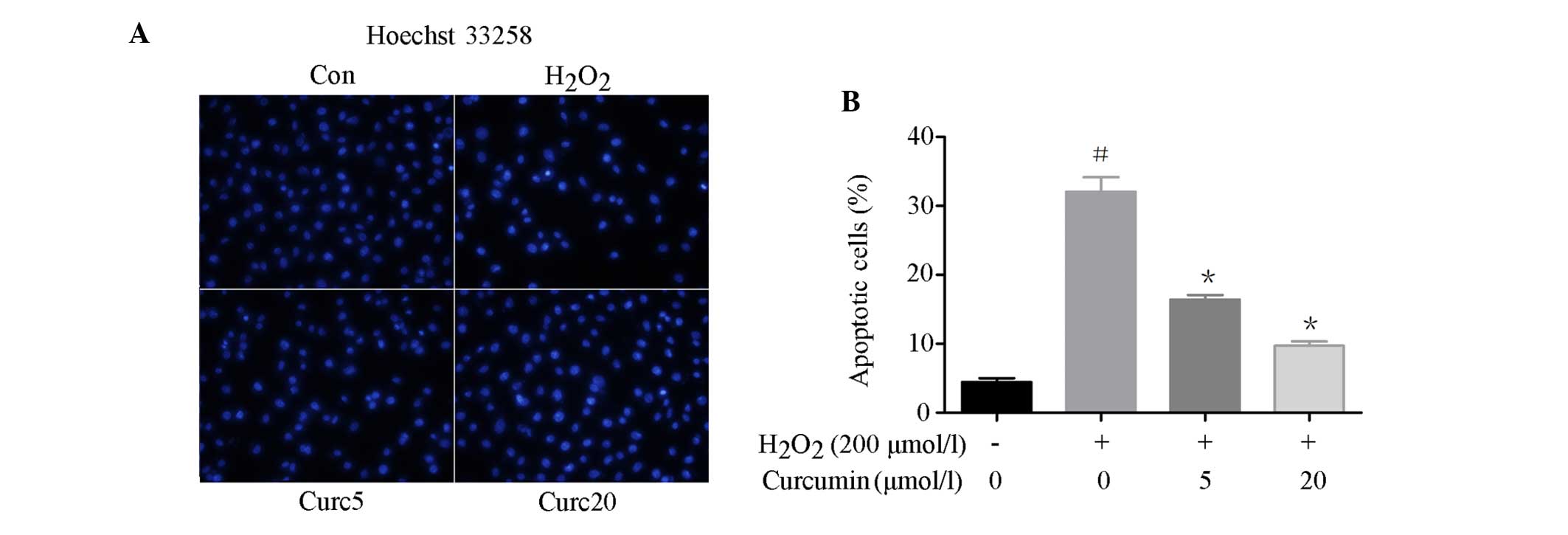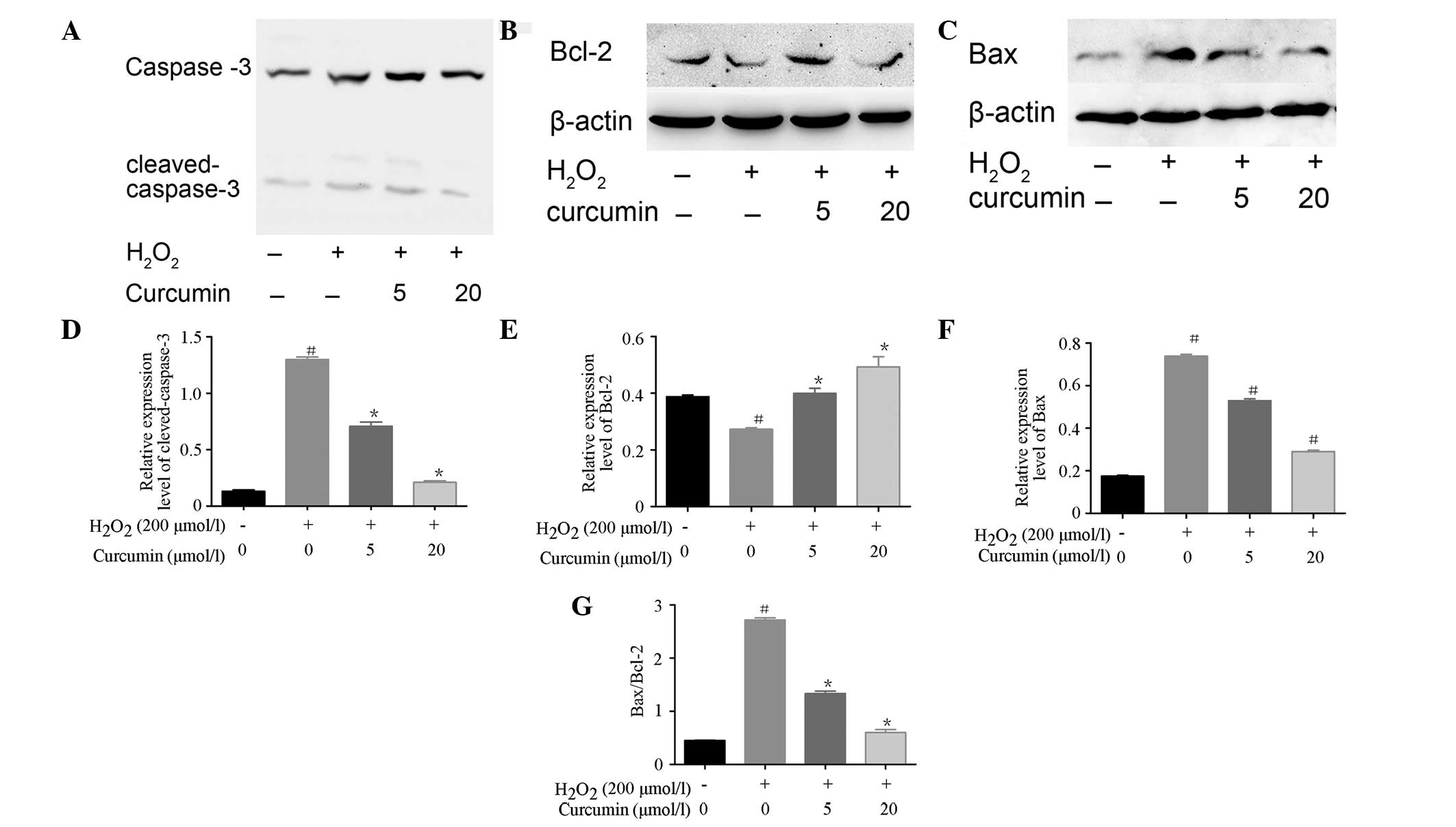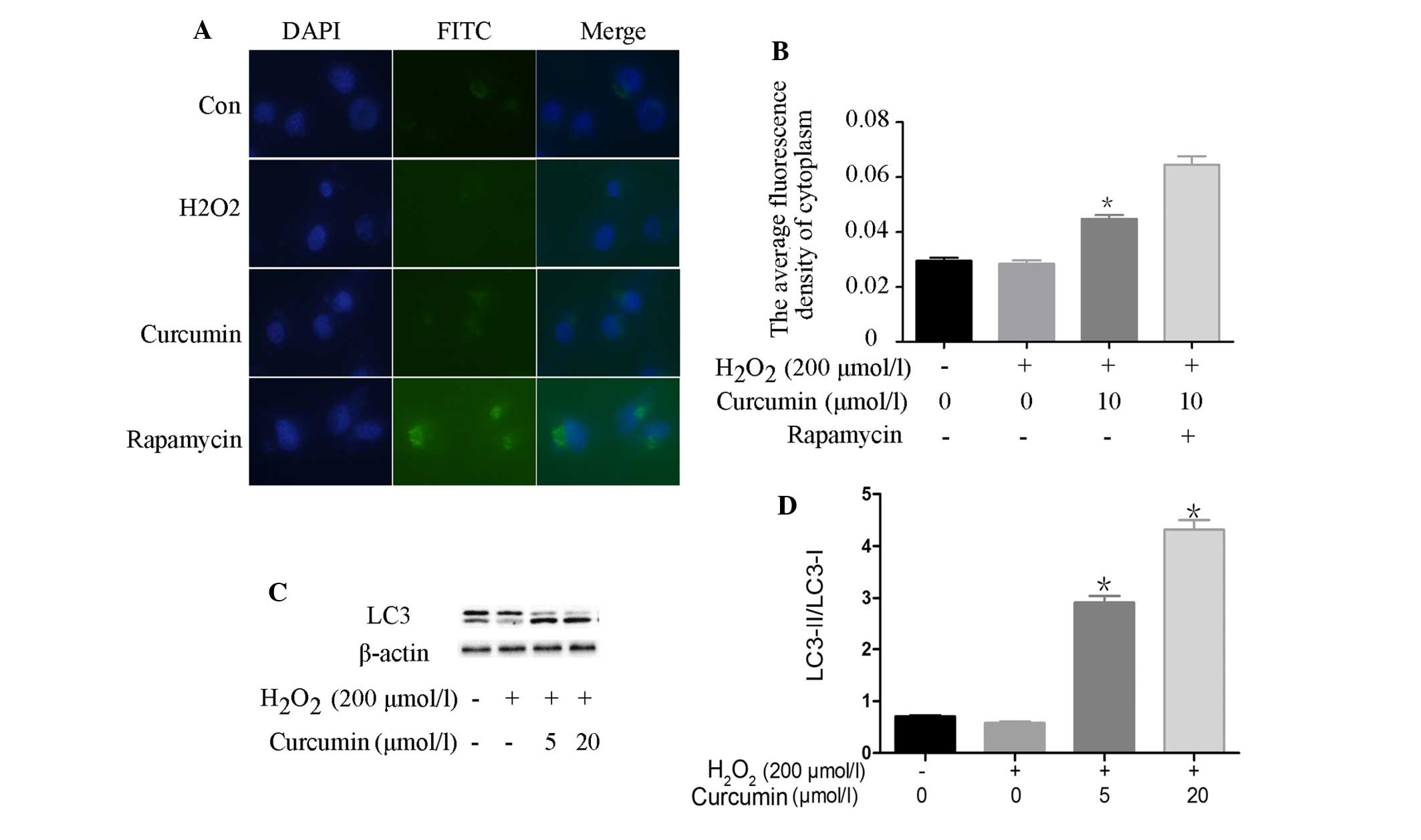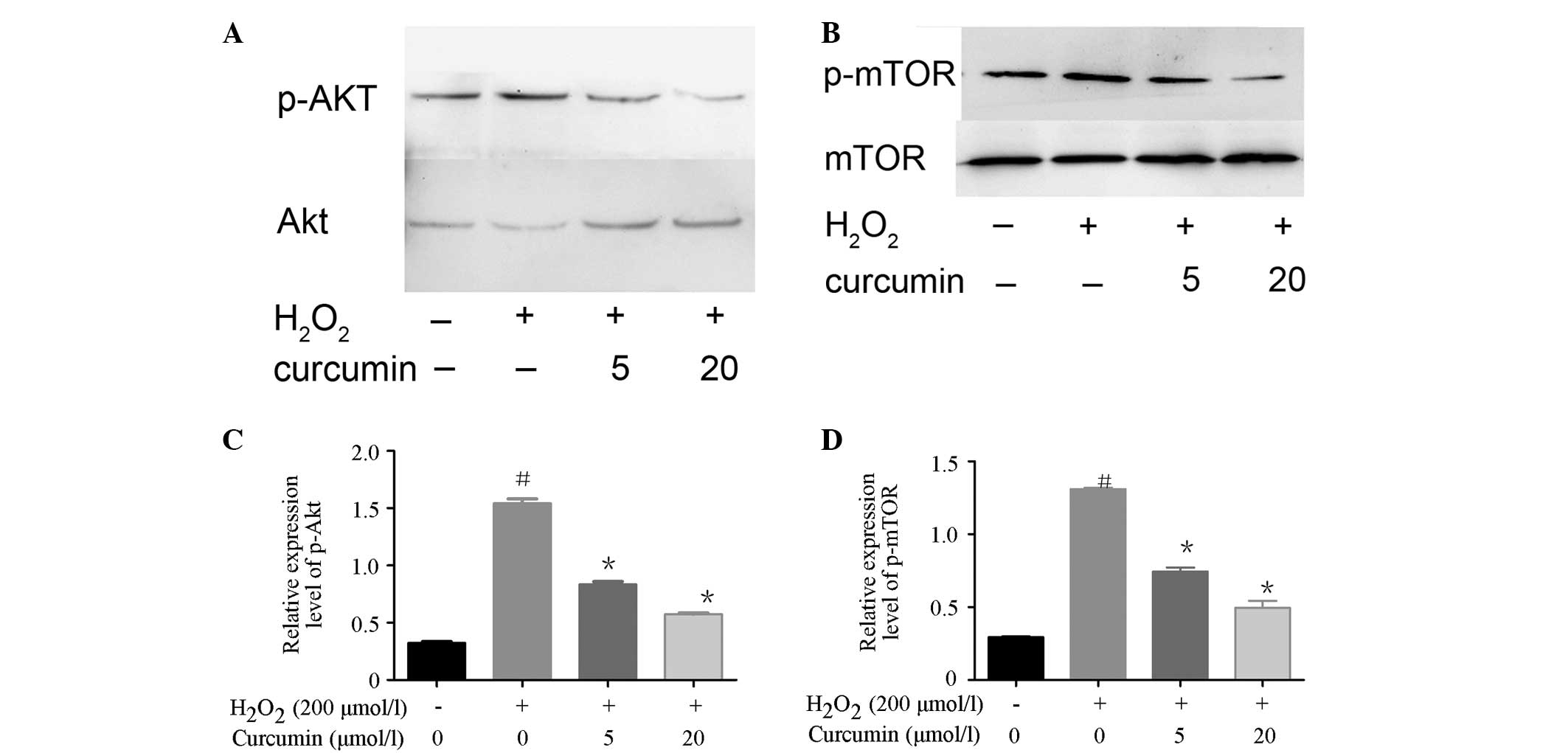|
1
|
Kim YS, Ahn Y, Hong MH, Joo SY, Kim KH,
Sohn IS, Park HW, Hong YJ, Kim JH, Kim W, et al: Curcumin
attenuates inflammatory responses of TNF-alpha-stimulated human
endothelial cells. J Cardiovasc Pharmacol. 50:41–49. 2007.
View Article : Google Scholar : PubMed/NCBI
|
|
2
|
Lubbad A, Oriowo MA and Khan I: Curcumin
attenuates inflammation through inhibition of TLR-4 receptor in
experimental colitis. Mol Cell Biochem. 322:127–135. 2009.
View Article : Google Scholar
|
|
3
|
Miriyala S, Panchatcharam M and
Rengarajulu P: Cardioprotective effects of curcumin. Adv Exp Med
Biol. 595:359–377. 2007. View Article : Google Scholar : PubMed/NCBI
|
|
4
|
Aggarwal BB and Harikumar KB: Potential
therapeutic effects of curcumin, the anti-inflammatory agent,
against neurodegenerative, cardiovascular, pulmonary, metabolic,
autoimmune and neoplastic diseases. Int J Biochem Cell Biol.
41:40–59. 2009. View Article : Google Scholar :
|
|
5
|
Nazam Ansari M, Bhandari U and Pillai KK:
Protective role of curcumin in myocardial oxidative damage induced
by isoproterenol in rats. Hum Exp Toxicol. 26:933–938. 2007.
View Article : Google Scholar
|
|
6
|
Naik SR, Thakare VN and Patil SR:
Protective effect of curcumin on experimentally induced
inflammation, hepatotoxicity and cardiotoxicity in rats: Evidence
of its antioxidant property. Exp Toxicol Pathol. 63:419–431. 2011.
View Article : Google Scholar
|
|
7
|
Zanchetti A, Hennig M, Hollweck R, Bond G,
Tang R, Cuspidi C, Parati G, Facchetti R and Mancia G: Baseline
values but not treatment-induced changes in carotid intimamedia
thickness predict incident cardiovascular events in treated
hypertensive patients: Findings in the European Lacidipine Study on
Atherosclerosis (ELSA). Circulation. 120:1084–1090. 2009.
View Article : Google Scholar : PubMed/NCBI
|
|
8
|
Motterlini R, Foresti R, Bassi R and Green
CJ: Curcumin, an antioxidant and anti-inflammatory agent, induces
heme oxygenase-1 and protects endothelial cells against oxidative
stress. Free Radic Biol Med. 28:1303–1312. 2000. View Article : Google Scholar : PubMed/NCBI
|
|
9
|
Green DR: Apoptotic pathways: Ten minutes
to dead. Cell. 121:671–674. 2005. View Article : Google Scholar : PubMed/NCBI
|
|
10
|
Mizushima N, Levine B, Cuervo AM and
Klionsky DJ: Autophagy fights disease through cellular
self-digestion. Nature. 451:1069–1075. 2008. View Article : Google Scholar : PubMed/NCBI
|
|
11
|
Takagi H, Matsui Y, Hirotani S, Sakoda H,
Asano T and Sadoshima J: AMPK mediates autophagy during myocardial
ischemia in vivo. Autophagy. 3:405–407. 2007. View Article : Google Scholar : PubMed/NCBI
|
|
12
|
Cao DJ, Wang ZV, Battiprolu PK, Jiang N,
Morales CR, Kong Y, Rothermel BA, Gillette TG and Hill JA: Histone
deacetylase (HDAC) inhibitors attenuate cardiac hypertrophy by
suppressing autophagy. Proc Natl Acad Sci USA. 108:4123–4128. 2011.
View Article : Google Scholar : PubMed/NCBI
|
|
13
|
Sinnberg T, Lasithiotakis K, Niessner H,
Schittek B, Flaherty KT, Kulms D, Maczey E, Campos M, Gogel J,
Garbe C and Meier F: Inhibition of PI3K-AKT-mTOR signaling
sensitizes melanoma cells to cisplatin and temozolomide. J Invest
Dermatol. 129:1500–1515. 2009. View Article : Google Scholar
|
|
14
|
Hietakangas V and Cohen SM: Regulation of
tissue growth through nutrient sensing. Annu Rev Genet. 43:389–410.
2009. View Article : Google Scholar : PubMed/NCBI
|
|
15
|
Kamada Y, Yoshino K, Kondo C, Kawamata T,
Oshiro N, Yonezawa K and Ohsumi Y: Tor directly controls the Atg1
kinase complex to regulate autophagy. Mol Cell Biol. 30:1049–1058.
2010. View Article : Google Scholar :
|
|
16
|
Tanida I, Ueno T and Kominami E: LC3
conjugation system in mammalian autophagy. Int J Biochem Cell Biol.
36:2503–2518. 2004. View Article : Google Scholar : PubMed/NCBI
|
|
17
|
Ong SB and Gustafsson AB: New roles for
mitochondria in cell death in the reperfused myocardium. Cardiovasc
Res. 94:190–196. 2012. View Article : Google Scholar :
|
|
18
|
Kowluru RA and Kanwar M: Effects of
curcumin on retinal oxidative stress and inflammation in diabetes.
Nutr Metab (Lond). 4:82007. View Article : Google Scholar
|
|
19
|
Quiles JL, Mesa MD, Ramírez-Tortosa CL,
Aguilera CM, Battino M, Gil Á and Ramírez-Tortosaet MC: Curcuma
longa extract supplementation reduces oxidative stress and
attenuates aortic fatty streak development in rabbits. Arterioscler
Thromb Vasc Biol. 22:1225–1231. 2002. View Article : Google Scholar : PubMed/NCBI
|
|
20
|
Yang Y, Duan W, Liang Z, Yi W, Yan J, Wang
N, Li Y, Chen W, Yu S, Jin Z and Yi D: Curcumin attenuates
endothelial cell oxidative stress injury through Notch signaling
inhibition. Cell Signal. 25:615–629. 2013. View Article : Google Scholar
|
|
21
|
Meng Z, Yan C, Deng Q, Gao DF and Niu XL:
Curcumin inhibits LPS-induced inflammation in rat vascular smooth
muscle cells in vitro via ROS-relative TLR4-MAPK/NF-κB pathways.
Acta Pharmacol Sin. 34:901–911. 2013. View Article : Google Scholar : PubMed/NCBI
|
|
22
|
Chanoit G, Lee S, Xi J, Zhu M, Mclntosh
RA, Mueller RA and Xu Z: Exogenous zinc protects cardiac cells from
reperfusion injury by targeting mitochondrial permeability
transition pore through inactivation of glycogen syntheses
kinase-3beta. Am J Physiol Heart Circ Physiol. 295:H1227–H1233.
2008. View Article : Google Scholar
|
|
23
|
Blanquicett C, Kang BY, Ritzenthaler JD,
Jones DP and Hart CM: Oxidative stress modulates PPAR gamma in
vascular endothelial cells. Free Radic Biol Med. 48:1618–1625.
2010. View Article : Google Scholar : PubMed/NCBI
|
|
24
|
Chung S, Yao H, Caito S, Hwang JW,
Arunachalam G and Rahman I: Regulation of SIRT1 in cellular
functions: Role of polyphenols. Arch Biochem Biophys. 501:79–90.
2010. View Article : Google Scholar : PubMed/NCBI
|
|
25
|
Guo SY and Long MZ: Effects of curcumin on
expression of MCP-1 induced by H2O2 in
myocardial cell. Nanjing Yi Ke Da Xue Xue Bao. 4:442–444. 2010.In
Chinese.
|
|
26
|
Basile V, Belluti S, Ferrari E, Gozzoli C,
Ganassi S, Quaglino D, Saladini M and Imbriano C:
bis-Dehydroxy-Curcumin triggers mitochondrial-associated cell death
in human colon cancer cells through ER-stress induced autophagy.
PLoS One. 8:e536642013. View Article : Google Scholar : PubMed/NCBI
|
|
27
|
Li B, Takeda T, Tsuiji K, Wong TF,
Tadakawa M, Kondo A, Nagase S and Yaegashi N: Curcumin induces
cross-regulation between autophagy and apoptosis in uterine
leiomyosarcoma cells. Int J Gynecol Cancer. 23:803–808. 2013.
View Article : Google Scholar : PubMed/NCBI
|
|
28
|
Romero-Hernández MA, Eguía-Aguilar P,
Perézpeña-DiazConti M, Rodríguez-Leviz A, Sadowinski-Pine S,
Velasco-Rodríguez LA, Cáceres-Cortés JR and Arenas-Huertero F:
Toxic effects induced by curcumin in human astrocytoma cell lines.
Toxicol Mech Methods. 23:650–659. 2013. View Article : Google Scholar : PubMed/NCBI
|
|
29
|
Qu W, Xiao J, Zhang H, Chen Q, Wang Z, Shi
H, Gong L, Chen J, Liu Y, Cao R and Lv J: B19, a novel monocarbonyl
analogue of curcumin, induces human ovarian cancer cell apoptosis
via activation of endoplasmic reticulum stress and the autophagy
signaling pathway. Int J Biol Sci. 9:766–777. 2013. View Article : Google Scholar : PubMed/NCBI
|
|
30
|
Xiao K, Jiang J, Guan C, Dong C, Wang G,
Bai L, Sun J, Hu C and Bai C: Curcumin induces autophagy via
activating the AMPK signaling pathway in lung adenocarcinoma cells.
J Pharmacol Sci. 123:102–109. 2013. View Article : Google Scholar : PubMed/NCBI
|
|
31
|
Yosifov DY, Kaloyanov KA, Guenova ML,
Prisadashka K, Balabanova MB, Berger MR and Konstantinov SM:
Alkylphosphocholines and curcumin induce programmed cell death in
cutaneous T-cell lymphoma cell lines. Leuk Res. 38:49–56. 2014.
View Article : Google Scholar
|
|
32
|
Rubinsztein DC, Gestwicki JE, Murphy LO
and Klionsky DJ: Potential therapeutic applications of autophagy.
Nat Rev Drug Discov. 6:304–312. 2007. View Article : Google Scholar : PubMed/NCBI
|
|
33
|
Meléndez A and Neufeld TP: The cell
biology of autophagy in metazoans: A developing story. Development.
135:2347–2360. 2008. View Article : Google Scholar : PubMed/NCBI
|
|
34
|
Yang Z and Klionsky DJ: Eaten alive: A
history of macroautophagy. Nat Cell Biol. 12:814–822. 2010.
View Article : Google Scholar : PubMed/NCBI
|
|
35
|
Baehrecke EH: Autophagy: Dual roles in
life and death? Nat Rev Mol Cell Biol. 6:505–510. 2005. View Article : Google Scholar : PubMed/NCBI
|
|
36
|
Mariño G, Niso-Santano M, Baehrecke EH and
Kroemer G: Self-consumption: The interplay of autophagy and
apoptosis. Nat Rev Mol Cell Biol. 15:81–94. 2014. View Article : Google Scholar : PubMed/NCBI
|
|
37
|
Kroemer G and Jäättelä M: Lysosomes and
autophagy in cell death control. Nat Rev Cancer. 5:886–897. 2005.
View Article : Google Scholar : PubMed/NCBI
|
|
38
|
Lum JJ, DeBerardinis RJ and Thompson CB:
Autophagy in metazoans: Cell survival in the land of plenty. Nat
Rev Mol Cell Biol. 6:439–448. 2005. View Article : Google Scholar : PubMed/NCBI
|
|
39
|
Kubota C, Tor S, Hou N, Saito N, Yoshimoto
Y, Imai H and Takeuchi T: Constitutive reactive oxygen species
generation from autophagosome/lysosome in neuronal oxidative
toxicity. J Biol Chem. 285:667–674. 2010. View Article : Google Scholar :
|
|
40
|
Kiffin R, Bandyopadhyay U and Cuervo AM:
Oxidative stress and autophagy. Antioxid Redox Signal. 8:152–162.
2006. View Article : Google Scholar : PubMed/NCBI
|
|
41
|
Fischer U and Schulze-Osthoff K: New
approaches and therapeutics targeting apoptosis in disease.
Pharmacol Rev. 57:187–215. 2005. View Article : Google Scholar : PubMed/NCBI
|
|
42
|
Jung CH, Ro SH, Cao J, Otto NM and Kim DH:
mTOR regulation of autophagy. FEBS Lett. 584:1287–1295. 2010.
View Article : Google Scholar : PubMed/NCBI
|
|
43
|
Hay N and Sonenberg N: Upstream and
downstream of mTOR. Genes Dev. 18:1926–1945. 2004. View Article : Google Scholar : PubMed/NCBI
|
|
44
|
Alers S, Löffler AS, Wesselborg S and
Stork B: Role of AMPK-mTOR-Ulk1/2 in the regulation of autophagy:
Cross talk, shortcuts, and feedbacks. Mol Cell Biol. 32:2–11. 2012.
View Article : Google Scholar :
|



















